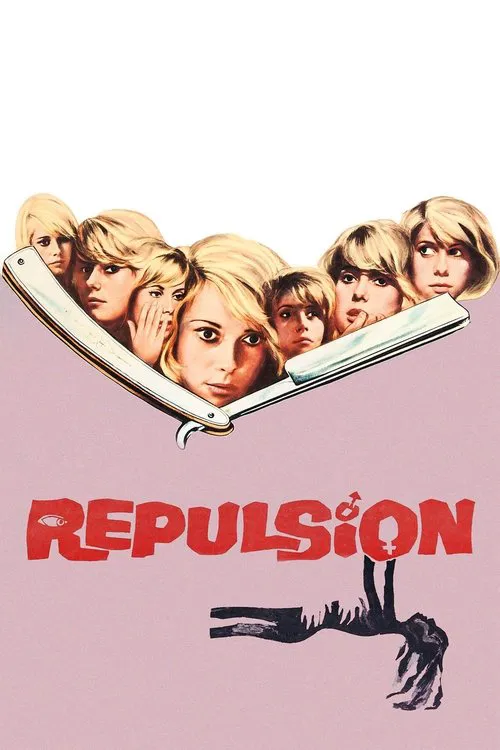Repulsion

Plot
In French New Wave cinema's 1965 psychological thriller, 'Repulsion,' director Roman Polanski masterfully crafts a tense atmosphere of repressed desires and blurring realities. The narrative focuses on Carole, a young and beautiful manicurist played by Catherine Deneuve, who finds herself trapped in an existential crisis. As the days pass and her sister Helen, who she shares a small London flat with, prepares to leave for an Italian holiday, the boundaries between reality and Carole's inner world begin to fade. Carole's condition worsens as she becomes increasingly paranoid and detached. She suffers from severe androphobia, a pathological fear of men. The claustrophobic and isolated setting she finds herself in, exacerbates her condition as she struggles to maintain a grip on her sanity. She locks herself in her flat, unable and unwilling to confront the outside world. In her withdrawal from reality, she finds herself tormented by a series of hallucinations that blur the lines between dreams and reality. As these frightening visions take hold, Carole's grip on her sanity begins to slip, culminating in a catastrophic breakdown. Polanski employs a unique narrative structure, one that blurs the lines between reality and the supernatural. He skillfully manipulates the tension and builds the atmosphere of unease as the audience is left uncertain about what is real and what is just Carole's fragile psyche playing tricks on her. Through a deliberate use of long takes and atmospheric cinematography, Polanski evokes an eerie sense of isolation in the dingy and rundown London flat, heightening the sense of claustrophobia that Carole feels suffocating her. As the narrative progresses, the lines between Carole's reality and her hallucinations become increasingly blurred. Her visions, though frightening, hold an eerily logical quality to them, further reinforcing the audience's suspicion that Carole's perceptions of reality may be distorted. Polanski's use of symbolism and visual motifs adds depth to the narrative, inviting the audience to interpret the meaning behind Carole's hallucinations. They may be seen as a manifestation of her suppressed desires, or simply a product of her fractured psyche. One of the most striking aspects of 'Repulsion' is Polanski's portrayal of Carole's relationship with her sister Helen, played by Françoise Dorléac. Helen is a confident and assertive woman who seems at odds with Carole's fragile and introverted nature. As their dynamic is portrayed, particularly in the early scenes, the audience begins to understand the root causes of Carole's repressed desires and paranoia. In her fear of intimacy and men, Carole feels trapped by her own emotions and inadequacies. Deneuve gives a haunting performance as Carole, conveying the character's fragile state of mind through a series of subtle expressions and body language. She manages to evoke a deep sense of empathy in the audience, making them feel uneasy about the state of her character's mental health. Her fragile and introverted portrayal of Carole humanizes her character and raises important questions about the societal pressures placed on young women, particularly those with mental health issues. 'Repulsion' has been praised for its pioneering approach to the depiction of mental illness, particularly for a film released in the mid-1960s. Its unique narrative structure and Polanski's masterful direction make it a groundbreaking work in the thriller genre. As a cinematic experience, 'Repulsion' is as unsettling as it is visually stunning. Polanski's exploration of the repressed desires that drive the plot of this film marks the beginning of a new era in cinematic storytelling.
Reviews
Recommendations




